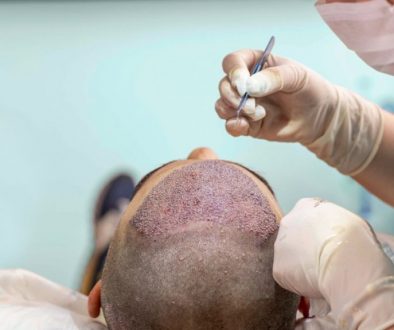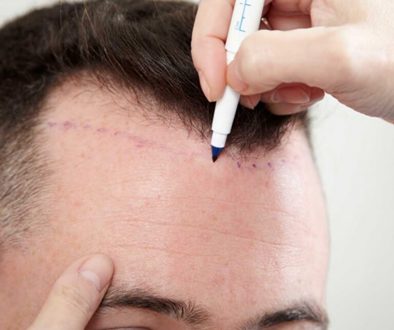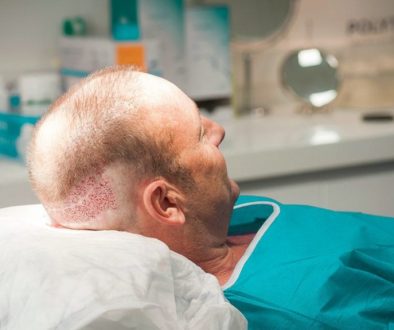Is Propecia (Finasteride) Required After Hair Transplant Surgery?
This question was posed by a hair loss sufferer seeking hair loss help on our hair restoration forum and answered by Dr. Michael Beehner of Saratoga Springs, NY. Dr. Beehner is one of our recommended hair restoration physicians. His professional answer is below.
I’m doing some research on hair loss and wondering if a DHT blocker is still required after a hair transplant for androgenic alopecia? If not then how is this possible if it is considered genetic? Surely the excess production of DHT will attack the new hair follicles?
 “Attacking” is probably not the best way to think about what is happening. A better way to picture it is that the presence of DHT (which virtually every man has) PERMITS the genetic expression of each individual follicle to occur. The follicles on the sides and back of our heads have no genetic programming for miniaturization and eventual loss, whereas the follicles on the top of the head of men with hair loss do have this genetic programming. An experiment was done around 50 years ago, I believe by a Dr. Hamilton, in which he followed the paths of around a dozen pairs of identical twins, one of which was institutionalized and castrated (yes, those things occurred back then!) and the other was mentally normal and out in the world. The twin who was not castrated went on to lose all his hair on top, but the twin brother in the institution kept all of his hair because he there was no DHT present, since the testicles which produce testosterone, which breaks down into DHT, weren’t present. My recollection is they then gave testosterone to the institutionalized twin (cruelty on top of cruelty) and he then went on to lose his hair.
“Attacking” is probably not the best way to think about what is happening. A better way to picture it is that the presence of DHT (which virtually every man has) PERMITS the genetic expression of each individual follicle to occur. The follicles on the sides and back of our heads have no genetic programming for miniaturization and eventual loss, whereas the follicles on the top of the head of men with hair loss do have this genetic programming. An experiment was done around 50 years ago, I believe by a Dr. Hamilton, in which he followed the paths of around a dozen pairs of identical twins, one of which was institutionalized and castrated (yes, those things occurred back then!) and the other was mentally normal and out in the world. The twin who was not castrated went on to lose all his hair on top, but the twin brother in the institution kept all of his hair because he there was no DHT present, since the testicles which produce testosterone, which breaks down into DHT, weren’t present. My recollection is they then gave testosterone to the institutionalized twin (cruelty on top of cruelty) and he then went on to lose his hair.
Regarding the question of whether a man who has had surgical hair restoration is better off taking finasteride after his transplant or not, I believe he is – providing he has native hair on top that can still be salvaged and reversed from hair miniaturization. If he is middle ages and a class VI on the Norwood Scale of hair loss (shiny bald on top), then I generally don’t advise taking it. I don’t believe good proof has ever been shown that transplants do better with Propecia (finasteride).
A good way to picture the benefit of adding finasteride to the hair loss treatment package along with transplants is this: imagine two men with a similar hair loss pattern have a hair transplant and then return to see their doctor 4-5 years later. One takes finasteride and the other does not. The majority of men using finasteride, in my experience, have a net gain of hair mass during those first 5 years of treatment. When the doctor and the patient who had transplants plus finasteride looks at his results, he is looking at an ADDITION of two things: the newly moved transplanted hair PLUS the increase in hair mass from the medication. The other fellow who didn’t take finasteride is instead looking at a SUBTRACTION on his head: the addition of the transplanted hair on top MINUS the increase in male pattern baldness that occurred during those years. That difference is a huge one. The man who doesn’t take finasteride often unfairly blames his hair surgeon for not bringing about the transformation he envisioned, whereas the patient who did both often gives undeserved credit to the transplant for creating such a great result when half of the credit is probably due to the finasteride.
Mike Beehner, M.D.
—
Bill Seemiller
Associate Publisher/Editor
Technorati Tags: hair loss, hair loss help, Dr. Beehner, DHT, hair transplant, androgenic alopecia, hair restoration, finasteride, hair miniaturization, bald, Propecia, hair loss treatment, hair loss pattern, transplanted hair, male pattern baldness, hair surgeon




June 25, 2012 @ 2:31 pm
Hi Cart,
I have not heard of this before. However, I do highly recommend consulting with a physician about the issue and any other adverse effects you’re currently experiencing.
Furthermore, if you’re interested in discussing the medication with Propecia (finasteride) users, I do invite you to review current discussions on our hair restoration network (www.hairrestorationnetwork.com).
Good luck!
Blake (Future_HT_Doc)
Editorial Assistant
June 21, 2012 @ 3:14 pm
I was on Finasteride for 6 months, eventually I noticed a denser hair. My case is unique, I have been suffering with constipation when I continued to use it and when I stopped using it, I was normal within a fortnight. I feel I am an odd man out, since no one ever complained about constipation with the use of Finasteride. However I convince myself that the side effects of this drug could be unique for individuals. I would welcome comments from my fellow Fin users.
May 14, 2012 @ 11:14 am
Many leading Hair Transplant surgeons will extend into the upper areas well above the ears since in many cases; the densest and most viable hair resides there. It’s also typically easier to conceal and hide the scar in these areas. Moreover, additional risks of scar stretching exist when hair is excised too closely to the ears. To stay within the universal safe zone, physicians who extend into the upper levels won’t want to extend
April 26, 2012 @ 5:40 am
I cannot understand how so many professionals and doctors ADVISE people to take a drug with known, damaging side effects?? Is this ethical? Or legal? The side effects of Finasteride (propecia, proscar) are often PERMANENT…..believe me, you are better bald or with thin hair than having a life time of drug-induced side effetcs. Do not listen to the so called “professionals”… do you own research and trust your instinct. I will not take that stuff and I would not advise anyone else to.
July 1, 2011 @ 10:31 pm
I Had a hair transplant and took propecia. The side effects were horrible experienced it all. Loss of libido, erectile dysfunction, decreased muscle mass, swelling of the breasts, lethargy (loss of energy ) suicidal depression, swollen hands, muscle spasms and memory fog…I took the drug for 6 months in 2005 and i didnt monitor the side effect but looking back i can remember being more anti social more having more anxiety and when my breast were swollen i thought it was because i had been hitting the gym hard and doing chest exercises. I do remember having a bit of difficulty maintaining an erection but didn’t put the two together. I recently took it again after a hair transplant at the age of 31 and my breast swole up even more… It basically turned me into a women..They say 2 percent have side effects but its probably way more than that its just that people don’t monitor there side effects and then there bodies tolerate the drug but in the long run there screwing up there endocrine system and central nervous system and this drug has no long term study. My advice would be to stay away from this drug it is dangerous and will eventually ruin your life..
August 6, 2010 @ 2:06 am
Finasteride works by inhibiting the conversion of testosterone to DHT. DHT is a powerful sex hormone that is the main culprit in causing androgenic alopecia or male pattern baldness.
Less than 2% of men experience sexual side effects while taking Propecia (finasteride). These side effects should subside with discontinuation of the medication.
David (TakingThePlunge)
August 3, 2010 @ 10:48 pm
Dear sir
please tell me. how do work finasteride? Or any sexual problem.
October 12, 2009 @ 11:48 am
i used minoxidil and topical copper peptide on my hair loss and male patterned baldness. it seems effective.
September 28, 2009 @ 5:01 am
i deal with hair loss and baldness by using topical anti-androgens and also minoxidil lotion. somehow it helps slow down hair loss.
August 20, 2009 @ 9:59 am
what i do to combat hair loss is use minoxidil and also topical copper peptide.